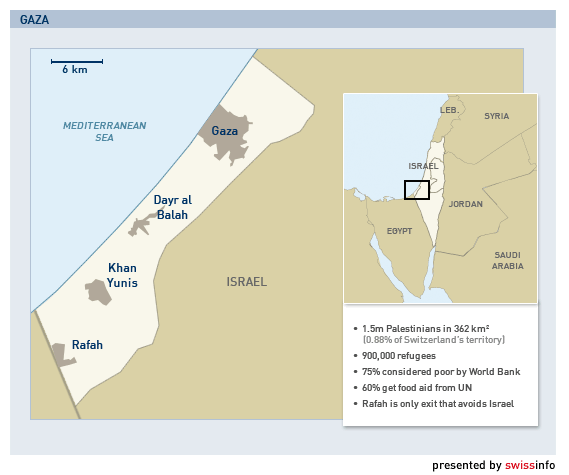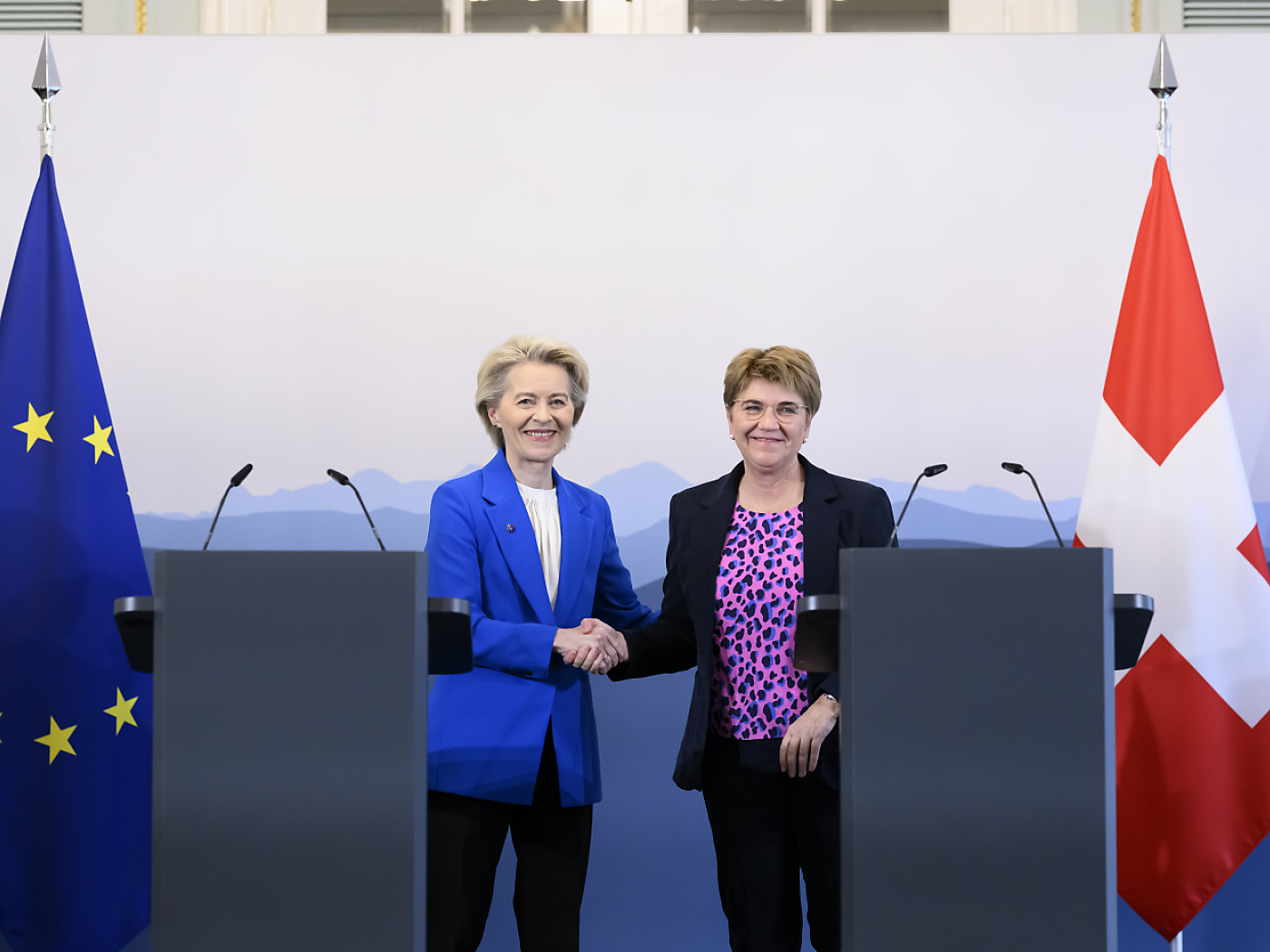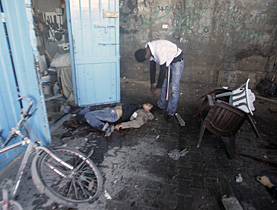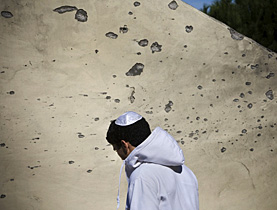Ceasefire is the aim for Gaza, diplomat says

Israel is not looking to eradicate the Hamas organisation in the Gaza Strip despite waging an intense military campaign, according to its ambassador in Switzerland.
Ilan Elgar tells swissinfo his country is looking for a long-term ceasefire with the Palestinian territory’s main political force, one that will ensure a peaceful life for Israelis in the southern part of the country.
Yet on Friday, Israel rejected a United Nations resolution calling for a ceasefire in Gaza, as jets and tanks again pounded the Palestinian enclave.
With hundreds of civilians killed, Israel’s actions have been denounced by the Swiss-run International Committee of the Red Cross, UN agencies and Arab and European governments.
swissinfo: The UN is pushing for a ceasefire in the Gaza Strip. Is Israel actually prepared to accept such a deal?
Ilan Elgar: Israel has always been looking for a ceasefire, even before this operation.
It came about because Hamas on December 19 annulled the tentative ceasefire that had lasted six months. But a ceasefire is like a tango: it needs two people. And Hamas has ruled out any ceasefire so I don’t know what the chance is [the fighting] will stop at this stage.
swissinfo: This operation will not bring about the end of Hamas. So why such a show of strength?
I.E.: Eradicating Hamas is not the aim of this operation. Hamas is well entrenched in Palestinian society and Gaza. We aren’t kidding ourselves that we can eliminate it.
The only thing we are trying to do is to bring back a sense of security to people in southern Israel and to prevent the conditions that have led to this impossible situation. What we are aiming for is a long-term ceasefire. I don’t think we can realistically aim for much more than that.
What we have to do is to make Hamas understand the conditions of a reasonable ceasefire by which we will refrain from harming anybody in Gaza and make life there bearable.
This means Hamas should also refrain from disturbing normal life in southern Israel. This includes an end to the smuggling of longer-range weapons into Gaza.
When the last ceasefire was declared earlier last year, Hamas rockets could travel 16 kilometres into Israel. By the end of the ceasefire, their range was 40 kilometres. Hamas used that time to replenish and rearm itself.
swissinfo: But given the strength of Israeli operations in the Gaza Strip, isn’t there a good chance that certain Palestinian elements will become more radical?
I.E.: Frankly, they have been radicalised enough. It’s enough to listen to Hamas or look at their deeds to realise we have a part of the Palestinian population that is radicalised beyond anything we can imagine. You cannot go further than that.
We have a group of people who openly speak about the eradication of Israel. You cannot make them more radical.
swissinfo: The ICRC made the unusual step on Thursday of criticising Israeli operations in the Gaza Strip. It says humanitarian law is not being respected, especially access to wounded civilians, and claims the Israeli armed forces are preventing access.
I.E.: We are certainly not doing this. We have no interest in harming civilians or preventing medical care. There are cases where you cannot get to the injured because of the fighting.
I don’t need to know the specifics of a particular case to know that the Red Cross or any other organisation would not be prevented from getting to people who need help unless there was some overwhelming reason such as ongoing fighting.
swissinfo: The Israeli authorities have used the term proportional to describe the operations in the Gaza Strip. Western opinion seems at odds with this description. How do you explain this difference?
I.E.: There is no clear definition of proportionality. It’s very much a question of the eye of the beholder. It’s not something that can be settled by a textbook answer.
Proportionality does not mean that if Hamas has launched 8,000 Kassam rockets over the past eight years against the Israeli population, Israel will build the same number of homemade rockets and fire them back at Gaza. What we want is to end an untenable situation.
What we are trying not to do is harm the civilian population on the other side. This has its limitations though. Unfortunately, I’ve never heard of war where the innocent and civilians have not been hurt. Weapons that only hit fighting people do not exist.
But you can go out of your way to avoid civilian casualties. Gaza is a densely populated area and Hamas is using civilians as shields. There is too much evidence of this.
The Israeli armed forces have developed methods to avoid civilian casualties. We have no interest on moral, political and practical grounds to hit those not involved. Each and every Palestinian casualty is bad for us politically so we want to avoid it as much as possible.
swissinfo: A UN-backed school was attacked with dozens of deaths a few days ago. Israeli officials have said that some Hamas militants were nearby. Does the end still justify the means?
I.E.: Apparently the army found its targets. Two of the dead were known Hamas militants. Besides this, international law allows us to attack a civilian installation that is used for military actions. You cannot say because it is UN-run school that it is immune. A Hamas squad made use of people hiding inside the school, hoping the Israelis would not fire back.
swissinfo: Given the context, especially criticism from foreign governments, do you feel there is more anti-Israeli sentiment now?
I.E.: Obviously, this fighting and the civilian casualties generate controversy and raise the level of criticism. We find the positions and criticism somewhat one-sided.
We have to take into account we are not going to be treated impartially. Apparently it’s all right for Israelis to serve as victims, but not to respond.
swissinfo-interview: Scott Capper
Hamas emerged in 1987 at the beginning of the first intifada.
The name is the abbreviation for Islamic Resistance Movement, but it is also the Arabic word for “enthusiasm”.
Although its charter calls for the destruction of Israel, leaders have said they are prepared for a long-term truce if Israel withdraws from land captured in the 1967 war.
Most western states regard it as a terrorist organisation and refuse to deal with it.
Hamas won democratic elections in the Palestinian Territories in 2006.
It took power in Gaza in June 2007 after months of fighting with the rival Fatah movement of President Mahmud Abbas, which still runs the Palestinian-ruled parts of the West Bank.
Since then Israel has imposed a tight blockade on the Strip, allowing in only bare essentials.
Hamas has fired missiles at the Israeli town of Sderot; Israel says the current invasion is designed to protect its citizens there. At the end of last December, there had been 19 Israeli civilian deaths following rocket attacks since 2002.


In compliance with the JTI standards
More: SWI swissinfo.ch certified by the Journalism Trust Initiative












You can find an overview of ongoing debates with our journalists here . Please join us!
If you want to start a conversation about a topic raised in this article or want to report factual errors, email us at english@swissinfo.ch.